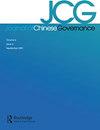Riding on the power of the masses? How different modes of mass mobilization shape local elite bargaining in China
IF 3.7
3区 社会学
Q1 POLITICAL SCIENCE
引用次数: 1
Abstract
Abstract When local bureaucrats in China disagree with their superiors, official channels for achieving a policy revision are limited and generally ineffective. However, if the stakes involved are high, they may turn to the power of the masses and draw on public pressure to enhance their negotiating position. In such informal inter-bureaucratic bargaining, local officials might intentionally facilitate popular protest and lead to a situation we call ‘mobilized instability.’ More commonly, they borrow power from ‘consent instability,’ that is, they discreetly leak insider information and instruct their police forces to be exceptionally tolerant. In this article, we use the redistricting case in Changxing county, Zhejiang province as well as other incidents to show how local officials can strategically exploit public pressure, in the mode of ‘consent instability,’ to extract policy concessions. We introduce the concept of ‘mobilized instability’ through an examination of jurisdictional restructuring conflict in Daye county, Hubei province. This analysis suggests that reckless intermediaries might over-mobilize and radicalize the masses, thereby undermining intentions and leading to serious consequences for the public officials. The article concludes that the power of the masses may serve as a credible bargaining chip during informal elite bargaining, but it can also be risky for those who handle it poorly.依靠群众的力量?不同的群众动员模式是如何塑造中国当地精英讨价还价的
摘要当中国的地方官僚与上级意见相左时,实现政策修订的官方渠道是有限的,而且通常是无效的。然而,如果涉及的风险很高,他们可能会求助于群众的力量,并利用公众压力来提高他们的谈判地位。在这种非正式的官僚间谈判中,地方官员可能有意为民众抗议提供便利,并导致我们称之为“动员性不稳定”的局面更常见的是,他们从“同意不稳定”中借用权力,也就是说,他们谨慎地泄露内幕信息,并指示警察部队格外宽容。在这篇文章中,我们利用浙江省长兴县的选区重新划分案件以及其他事件来展示地方官员如何在“同意不稳定”的模式下战略性地利用公众压力来获取政策让步。通过对湖北省大冶县管辖权调整冲突的考察,引入了“动员性不稳定”的概念。这一分析表明,鲁莽的中间人可能会过度动员和激进化群众,从而破坏意图,并给公职人员带来严重后果。文章的结论是,在非正式的精英谈判中,群众的力量可能是一个可信的筹码,但对于那些处理不力的人来说,这也可能是有风险的。
本文章由计算机程序翻译,如有差异,请以英文原文为准。
求助全文
约1分钟内获得全文
求助全文

 求助内容:
求助内容: 应助结果提醒方式:
应助结果提醒方式:


